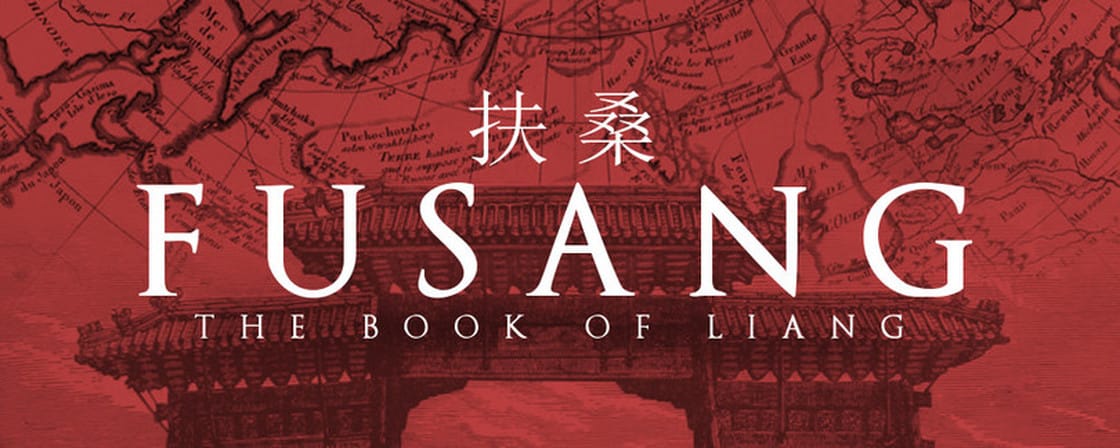Yao Silian
Liang Shu, Geography Section,
entry for "Fusang-guo"
635 CE
trans. Charles G. Leland
1875
|
NOTE |
The following account of the mythic land of Fusang appears in the court chronicle of Yao Silian written around 635 CE, quoting the secondhand account given by his father, Yao Cha, of events of 499 CE. Although most scholars identify Fusang with either the mythical East or (later) Japan, beginning in 1761 Western writers like Joseph de Guignes and Charles G. Leland argued that the text referred instead to various parts of North America, ranging from British Columbia to Mexico. Although Gustaaf Schlegel debunked the claim more than a century ago (America, for example, had no horses in 499 CE), some fringe historians continue to support the identification of Fusang with America.
|
Fusang-guo
During the reign of the dynasty Tsi, in the first year of the year-naming, ‘Everlasting Origin’ [499 CE], came a Buddhist priest from this kingdom, who bore the cloister-name of Hui Shen, i.e., Universal Compassion, to the present district of Hukuang, and those surrounding it, who narrated that Fusang is about twenty thousand li in an easterly direction from Da-han, and east of the Middle Kingdom. Many Fusang trees grow there, whose leaves resemble the Dryanda cordifolia; the sprouts, on the contrary, resemble those of the bamboo-tree, and are eaten by the inhabitants of the land. The fruit is like a pear in form, but is red. From the bark they prepare a sort of linen which they use for clothing, and also a sort of ornamented stuff. The houses are built of wooden beams; fortified and walled places are there unknown. They have written characters in this land, and prepare paper from the bark of the Fusang. The people have no weapons, and make no wars; but in the arrangements for the kingdom they have a northern and a southern prison. Trifling offenders were lodged in the southern prison, but those confined for greater offences in the northern; so that those who were about to receive grace could be placed in the southern prison, and those who were not, in the northern. Those men and women who were imprisoned for life were allowed to marry. The boys resulting from these marriages were, at the age of eight years, sold as slaves; the girls not until their ninth year.
If a man of any note was found guilty of crimes, an assembly was held; it must be in an excavated place. There they strewed ashes over him, and bade him farewell. If the offender was one of a lower class, he alone was punished; but when of rank, the degradation was extended to his children and grandchildren. With those of the highest rank it attained to the seventh generation.
The name of the king is pronounced Ichi. The nobles of the first-class are termed Tuilu; of the second, Little Tuilu; and of the third, Na-to-scha. When the prince goes forth, he is accompanied by horns and trumpets. The colour of his clothes changes with the different years. In the two first of the ten-year cycles they are blue; in the two next, red; in the two following, yellow; in the two next, red; and in the last two, black.
The horns of the oxen are so large that they hold ten bushels. They use them to contain all manner of things. Horses, oxen, and stags are harnessed to their wagons. Stags are used here as cattle are used in the Middle Kingdom, and from the milk of the hind they make butter. The red pears of the Fusang-tree keep good throughout the year. Moreover, they have apples and reeds. From the latter they prepare mats.
No iron is found in this land; but copper, gold, and silver are not prized, and do not serve as a medium of exchange in the market. Marriage is determined upon in the following manner:—The suitor builds himself a hut before the door of the house where the one longed for dwells, and waters and cleans the ground every morning and evening. When a year has passed by, if the maiden is not inclined to marry him, he departs; should she be willing, it is completed. When the parents die, they fast seven days. For the death of the paternal or maternal grandfather they lament five days; at the death of elder or younger sisters or brothers, uncles or aunts, three days. They then sit from morning to evening before an image of the ghost, absorbed in prayer, but wear no mourning-clothes. When the king dies, the son who succeeds him does not busy himself for three years with State affairs.
In earlier times these people lived not according to the laws of Buddha. But it happened that in the second year-naming ‘Great Light,’ of Song [458 CE], five beggar-monks from the kingdom of Kipin [in northeastern Afghanistan] went to this land, extended over it the religion of Buddha, and with it his holy writings and images. They instructed the people in the principles of monastic life, and so changed their manners.
If a man of any note was found guilty of crimes, an assembly was held; it must be in an excavated place. There they strewed ashes over him, and bade him farewell. If the offender was one of a lower class, he alone was punished; but when of rank, the degradation was extended to his children and grandchildren. With those of the highest rank it attained to the seventh generation.
The name of the king is pronounced Ichi. The nobles of the first-class are termed Tuilu; of the second, Little Tuilu; and of the third, Na-to-scha. When the prince goes forth, he is accompanied by horns and trumpets. The colour of his clothes changes with the different years. In the two first of the ten-year cycles they are blue; in the two next, red; in the two following, yellow; in the two next, red; and in the last two, black.
The horns of the oxen are so large that they hold ten bushels. They use them to contain all manner of things. Horses, oxen, and stags are harnessed to their wagons. Stags are used here as cattle are used in the Middle Kingdom, and from the milk of the hind they make butter. The red pears of the Fusang-tree keep good throughout the year. Moreover, they have apples and reeds. From the latter they prepare mats.
No iron is found in this land; but copper, gold, and silver are not prized, and do not serve as a medium of exchange in the market. Marriage is determined upon in the following manner:—The suitor builds himself a hut before the door of the house where the one longed for dwells, and waters and cleans the ground every morning and evening. When a year has passed by, if the maiden is not inclined to marry him, he departs; should she be willing, it is completed. When the parents die, they fast seven days. For the death of the paternal or maternal grandfather they lament five days; at the death of elder or younger sisters or brothers, uncles or aunts, three days. They then sit from morning to evening before an image of the ghost, absorbed in prayer, but wear no mourning-clothes. When the king dies, the son who succeeds him does not busy himself for three years with State affairs.
In earlier times these people lived not according to the laws of Buddha. But it happened that in the second year-naming ‘Great Light,’ of Song [458 CE], five beggar-monks from the kingdom of Kipin [in northeastern Afghanistan] went to this land, extended over it the religion of Buddha, and with it his holy writings and images. They instructed the people in the principles of monastic life, and so changed their manners.
|
Source: Translated by Charles G. Leland in Fusang: The Discovery of America by Chinese Buddhist Priests in the Fifth Century (New York: J. W. Bouton, 1875), 25-29. Leland interspersed commentary with the text, so I have followed the paragraphing of G. Schlegel in “Problèmes géographiques: Les Peuples Étrangers Chez les Historiens Chinois,” T’oung Pao 3, no. 2 (1892): 120-123.
|



